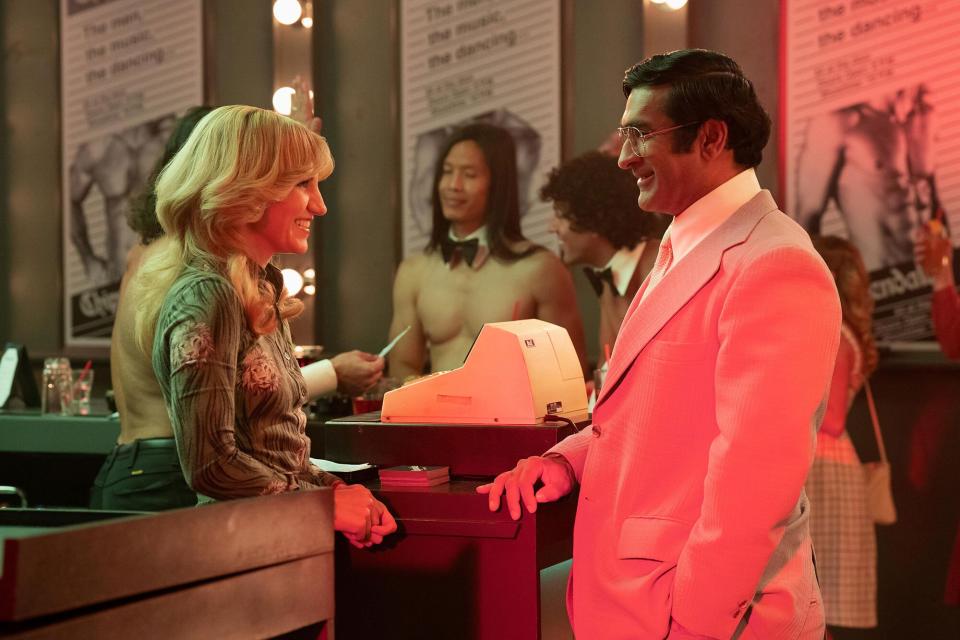Welcome to Chippendales review: Kumail Nanjiani outshines Hulu's so-so striptease saga
- Oops!Something went wrong.Please try again later.
- Oops!Something went wrong.Please try again later.
Dotdash Meredith and Yahoo Inc. may earn commission or revenue on some items through the links below.
The true-crime tale of Chippendales founder Somen "Steve" Banerjee has been told and re-told aplenty, through TV movies and docuseries, books and podcasts. It makes sense, as the saga of the erotic male strip troupe checks all the binge-worthy boxes: romance, arson, murder for hire, a jailhouse suicide, a self-made immigrant entrepreneur chasing the American dream. It's Theodore Dreiser by way of Dateline.
After several false starts on the big screen, the sordid story assumes its final form as an inevitable — and inevitably overlong — limited series on Hulu. Welcome to Chippendales doesn't reveal much those other projects haven't already covered, but it's buoyed by commanding performances from stars Kumail Nanjiani and Annaleigh Ashford.

Erin Simkin/Hulu Annaleigh Ashford and Kumail Nanjiani in 'Welcome to Chippendales'
Somen Banerjee (Nanjiani) has one goal: Take the money he's saved working as a Los Angeles gas station manager to open a classy, sophisticated establishment — like his idol, Hugh Hefner, did with the Playboy Club. But drawing a crowd proves harder than expected, and it's only after months of failed theme nights that Steve, as he now calls himself, has an epiphany: What about a strip club for women? When his arrangement with a slick nightclub promoter (Dan Stevens) ends in tragedy, Steve teams up with big-talking choreographer Nick De Noia (Murray Bartlett), whose biggest claim to fame is a pair of Emmys for a kids show called Unicorn Tales. From there, a g-string empire is born.
Steve is a man of control, discipline, and almost pathological ambition; Nick considers himself an artist and creative innovator. Their partnership is doomed from the start. Most of Chippendales' eight episodes focus on the battle for control of the booming business, which falls into a pattern: Nick takes credit for Chippendales' success; Steve retaliates by asserting his authority and/or undermining Nick's creative control; Irene (Ashford), Steve's accountant-turned wife, tries to keep the peace. By the time Banerjee enlists a loyal employee (Robin de Jesús) to solve his problems with violence, the series is almost over.
Chippendales spends too much time on Nick and Steve's tug-of-war for power and not enough on the complex (and far more interesting) ways Banerjee's immigrant experience drove his actions. Steve amasses wealth and all-American status symbols like a gold Rolex and a mansion, but the press embraces Nick — charming, telegenic, white — as the public face of Chippendales. Even though he's experienced discrimination for years, Steve conspires to keep Black men out of his clubs, leading to a class-action lawsuit that hastens Chippendales' financial troubles. (Never mind the hitmen — that's a show in itself!) Back in India, Steve's mother (Mona Sishodia) views his life with suspicion and dismay, wishing he'd chosen to stay with the family rather than running a "disreputable" nightclub in the States. "I can't believe you're my son," she wails. "You were a failure here, and now you're a failure there!" Steve, sitting alone in a plush leather chair behind his polished wood desk, puts down the phone and weeps.
Chippendales thrives in these moments of humanity. Steve often presents as socially awkward and stiff, and Nanjiani elicits a gentle humor from his character's mien without undercutting the seething indignation and pride he reveals in private. As Irene, Ashford is the series' emotional center, and she and Nanjiani have a tender, enchanting chemistry. Steve and Irene are like-minded number nerds; at their first meeting, she sends him into a swoon by suggesting he order the bartenders to put more ice in the drinks, which will save money on liquor costs. But Steve squanders his wife's faith in him one too many times, and when she leaves, both he and the show suffer.
Like so many other true-crime adaptations, Chippendales rushes through the aftermath of the crime at its center, cramming the totality of Steve's downfall into the 36-minute finale. It's a shame, because that's where the story could have gotten really interesting, as a ruthless, one-time power player is stripped down to nothing but the consequences of his own actions. Grade: B
Welcome to Chippendales premieres November 22 on Hulu.
Sign up for Entertainment Weekly's free daily newsletter to get breaking TV news, exclusive first looks, recaps, reviews, interviews with your favorite stars, and more.
Related content:

